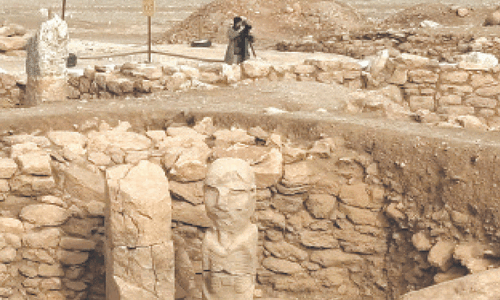KIEV: Viktor Yuschenko, winner of December’s heavily disputed Ukrainian presidential elections, is stepping up efforts to justify his reputation as a candidate of the West by seeking integration in the Euro-Atlantic community. The elections, which took weeks to unriddle due to fraud allegations from Yuschenko’s side, put the post-Soviet state in the spotlight of international politics, and caused discomfort between the West and Russia.
Prompted by his victory and by the enthusiasm both in western media and political circles, Yushchenko seized the opportunity to conduct talks with representatives of the EU and Nato. The issue of Ukraine joining NATO has, however, been postponed by both sides, with Western officials expressing concern that Kiev’s intentions might cause permanent damage in Russian-Nato as well as Russian-Ukrainian relations.
Under the previous government Ukraine was set to join the Russian-led initiative of a Single Economic Space (SES). While the new cabinet has promised to consider membership of the EU along with the SES, its presence in both organizations is impracticable, most commentators believe.
The SES would include, besides Ukraine and Russia, other post-Soviet states such as Kazakhstan and Belarus. However, Kiev is already attempting a smooth pullout. In spite of this, the EU’s reaction to Ukraine’s request for a clear membership prospect has been portrayed as “cold”. Yuschenko’s meeting with the EU external relations commissioner Benita Ferrero-Waldner resulted in the signature of an action plan to include certain political statements.
Ferrero-Waldner declared that “relations between the EU and Ukraine will become deeper and stronger” — conditional on Ukraine’s implementation of internal reform. This represents important milestones in Ukrainian politics, considering that Romano Prodi’s tenure as president of the European Commission last year ended with the assertion that Ukraine “will never be a member of the EU”. Helmut Kurth, political analyst and head of the Friedrich Ebert Foundation regional office in Kiev, believes the EU’s cautious attitude is affected by challenges arising from the approval of the European Constitution and its desire to successfully integrate the new members. “At this moment, the EU will not say anything that could give Ukraine the impression it can join,” he said.
Yet, he believes the door to Europe is not completely closed: “The EU’s message is: make your homework, as fast as you can, so that you can show a result to the other side.”
Much of the new cabinet’s efforts will have to be directed towards complying with the Copenhagen Criteria, “The future will show us how serious this government is,” said Kurth. However, Kurth also stressed that “Europe is very far”. “What kind of cultural, scientific or youth relationships are there? Very few. All these relations must grow,” he noted.
Ukraine is said to have very few real friends within the EU. Indeed, so far only some of the new members, linked by historical ties, have openly supported the country’s accession.
Brussels is expected to follow a wait-and-see strategy, both in reference to its own internal struggles and to the Ukrainian government’s ability to put words into action. Accordingly, there will be no special treatment solely on the basis of the “orange revolution”, as many Ukrainians had anticipated.
The first specific demands put out in the action plan relate to the reduction of trade barriers. This would allow Ukraine to be recognized as a market economy and to receive endorsement for its entry into the WTO.
Finally, negotiations on visa policy, border control, and re-organisation of energy markets are under way. Ukraine plays a vital role in the game of energy resources transport to Europe.
This is closely related to a third ‘wait-and-see’ game the EU will need to play. Brussels might welcome Ukraine in the future, but it will not do so at the price of angering Moscow. Each step taken by Ukraine will not only be judged for its internal results, but also for the ability Ukraine will show in appeasing Russia.—Dawn/The InterPress News Service.
































